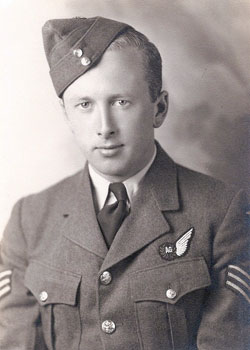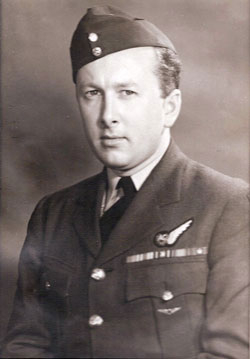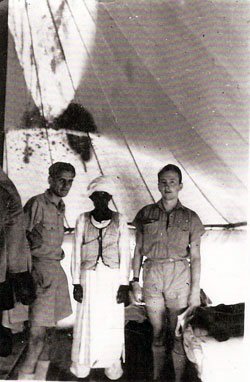Wall of Service
Column
19
Row
21
Flight Lieutenant Orland Ross Down (1922-2009)
The late Orland Ross Down passed through Pier 21 four times between 1941 and 1945. He was an eighteen year old young man from Charlottetown who joined the RCAF in 1940, trained in Canada as a wireless-operator/air-gunner and left for overseas from Halifax on the "Indrapoera" and arrived in Greenock, UK in June 1941.
After a tour of thirty-five operations (missions) with 37 Bomber Squadron RAF in North Africa, Flt/Sgt. Down was posted back to the UK by way of the Red Sea, Indian Ocean and the Cape of Good Hope. In Cape Town the airmen boarded the "Cape Town Castle"
"On December 1, 1942 I left Cape Town on the "Cape Town Castle" with Portsmouth, UK as our final destination with a call at Norfolk, Virginia to pick up American troops. The C.T.Castle was a troopship of 27,000 tons and on board were only 300 passengers-250 Americans who had been torpedoed near the Cape and 50 tour-expired RAF Middle East types (Canadians, Aussies, New Zealanders, Englishmen). The Americans all had individual staterooms and all 50 of us were stuffed in one room.
Upon arrival to the entrance to Norfolk we were diverted to New York because of a sub pack blocking the entrance and when approaching New York we were diverted to Halifax for the same reason. At the time I could not believe this to be true- back in Canada and so close to home! I believed it to be true only after the tugboat arrived with the marking Halifax, N.S. on it.
After docking there was very little information available so two of us were given permission to visit Eastern Command H.Q. I can still see the startled looks we got when we entered in dirty old army battledress with our wings, blue air force caps and me as a F/Sgt with an English metal crown. The real shocker came when we tried to exchange our foreign currency for Canadian. We were finally informed that we would be in port for four days and that we would have leave for that period.
I was the only one in the group who could get home and back in four days. I was the first tour-expired airman to arrive back in Charlottetown and I got the royal treatment. The president of the Canadian legion called and when he found out I had only a few days home he said "Chubby Power (a government official in Ottawa) is a personal friend of mine. I am going to give him a call and get you more leave." Within hours he called and said Mr. Power had granted me thirty days. I called Eastern Command and asked them to remove my kit from the "Cape Town Castle" and send it to me, which they did. At the end of my thirty days when I am to return, what happens? One of the propellers falls off the ferry between P.E.I. and N.B. and I am home another five days. I finally arrive and it took days to find out that I should be in the Repatriation depot in Rockcliffe, Ontario.
At Rockcliffe I found out that Mr. Power had forgotten to tell anyone of his granting me thirty days leave and I was charged with thirty-eight days AWOL. I was then paraded before the Wing Commander and after telling my story he dismissed the charge saying I was a "victim of circumstances". But the Air Force had the last laugh, they posted me as a screen (instructor) to 34 Operational Training Unit, TAF, at Pennfield Ridge, N.B. where I stayed for the next fifteen months."
Ross's next posting was to Comox, B.C. to train for transport Command on DC 3s and then it was back to Halifax to board the "Mauretania" which took the airmen to the UK. Ross and his crew joined 238 Transport Squadron RAF and flew to Burma where the squadron provided support for the X1V Army flying in supplies and evacuating casualties. In June 1945 the Squadron left Burma for Adelaide, South Australia to provide support for the Royal Navy Pacific Fleet.
After five months duty in Australia, 238 Squadron boarded ship in Sydney to return to the UK via the Indian Ocean, Red Sea, Mediterranean Sea and docked in Southampton. After a short time in England The Canadians and Americans in the Squadron left Liverpool on the "Duchess of Bedford" and arrived in Halifax on December 30, 1945, which was five months after the war in the Pacific had ended.
Ross was discharged from the RCAF on Februrary 7th, 1946 and the next year he joined the staff of the Charlottetown Post Office where he worked for twenty-seven years and retired as Post Master. In his retirement he was employed with a travel agency and was able to visit some of the places where he had served during WW2.
In 1945 F/L Orland Ross Down had been awarded with the following medals and decorations:1939-45 Star, Africa Star, Burma Star with Pacific Clasp, Defense Medal, Canadian Volunteer Service Medal with clasp War Medal 1939 - 45. He was awarded the Air Gunner's Badge in 1941 and was also awarded RCAF Operational Wings for gallant service in action against the enemy.


